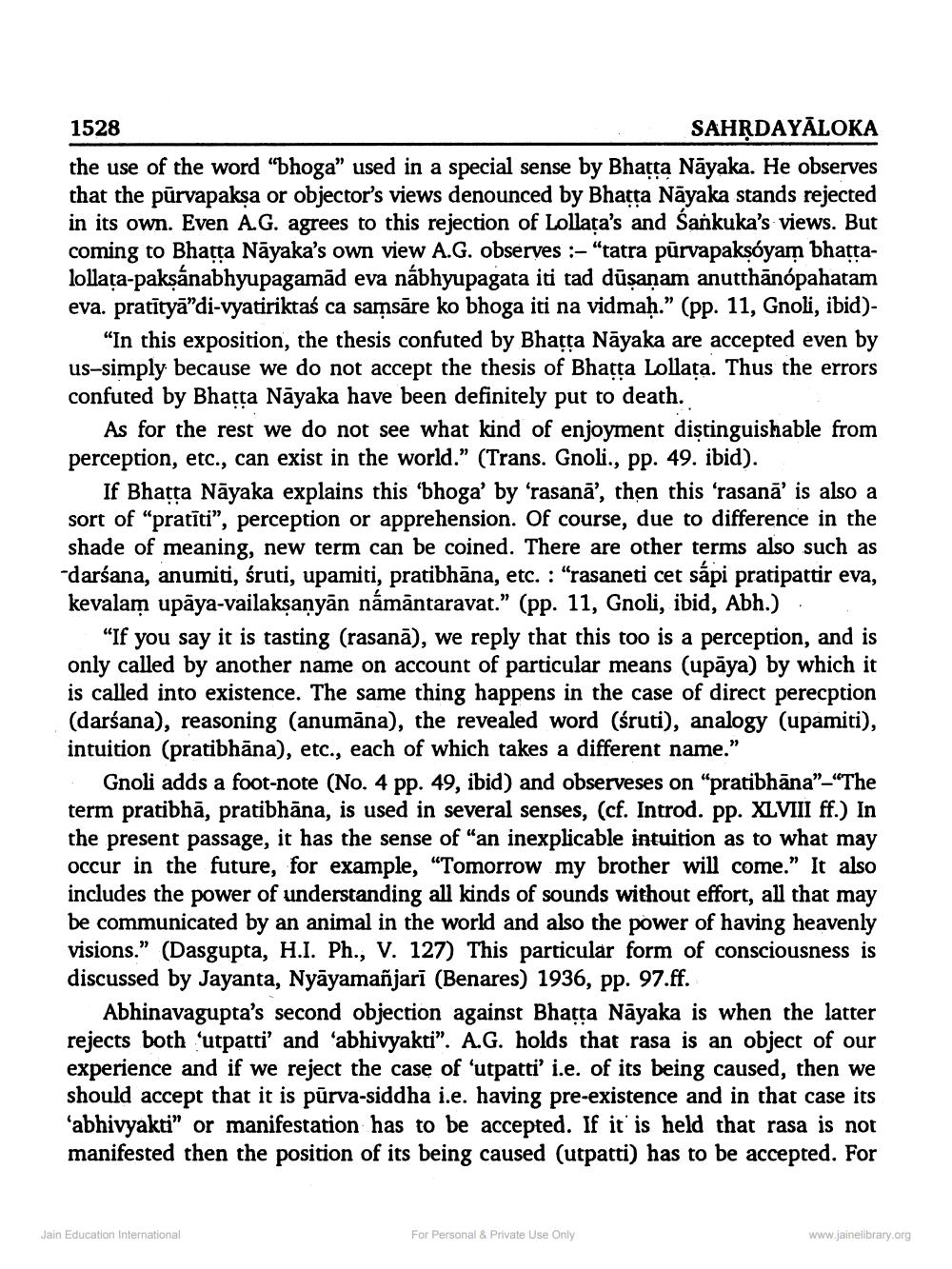________________
1528
SAHRDAYĀLOKA the use of the word “bhoga" used in a special sense by Bhasta Nāyaka. He observes that the pūrvapaksa or objector's views denounced by Bharta Nāyaka stands rejected in its own. Even A.G. agrees to this rejection of Lollata's and Sankuka's views. But coming to Bhasta Nāyaka's own view A.G. observes :- “tatra pūrvapaksóyam bhattalollața-pakşánabhyupagamād eva nábhyupagata iti tad dūşanam anutthānopahatam eva. pratītya’di-vyatiriktaś ca samsāre ko bhoga iti na vidmah.” (pp. 11, Gnoli, ibid)
"In this exposition, the thesis confuted by Bhatta Nāyaka are accepted even by us-simply because we do not accept the thesis of Bhatta Lollata. Thus the errors confuted by Bhatta Nāyaka have been definitely put to death.
As for the rest we do not see what kind of enjoyment distinguishable from perception, etc., can exist in the world.” (Trans. Gnoli., pp. 49. ibid).
If Bhatta Nāyaka explains this 'bhoga' by 'rasana', then this 'rasana' is also a sort of "pratīti", perception or apprehension. Of course, due to difference in the shade of meaning, new term can be co -darśana, anumiti, śruti, upamiti, pratibhāna, etc. : “rasaneti cet sápi pratipattir eva, kevalam upāya-vailakṣaṇyān námāntaravat.” (pp. 11, Gnoli, ibid, Abh.).
"If you say it is tasting (rasanā), we reply that this too is a perception, and is only called by another name on account of particular means (upāya) by which it
d into existence. The same thing happens in the case of direct perecption (darśana), reasoning (anumāna), the revealed word (śruti), analogy (upamiti), intuition (pratibhāna), etc., each of which takes a different name."
Gnoli adds a foot-note (No. 4 pp. 49, ibid) and observeses on "pratibhāna”-“The term pratibhā, pratibhāna, is used in several senses, (cf. Introd. pp. XLVIII ff.) In the present passage, it has the sense of "an inexplicable intuition as to what may occur in the future, for example, "Tomorrow my brother will come." It also includes the power of understanding all kinds of sounds without effort, all that may be communicated by an animal in the world and also the power of having heavenly visions." (Dasgupta, H.I. Ph., V. 127) This particular form of consciousness is discussed by Jayanta, Nyāyamañjarī (Benares) 1936, pp. 97.ff.
Abhinavagupta's second objection against Bhatta Nayaka is when the latter rejects both 'utpatti' and 'abhivyakti". A.G. holds that rasa is an object of our experience and if we reject the case of 'utpatti' i.e. of its being caused, then we should accept that it is pūrva-siddha i.e. having pre-existence and in that case its 'abhivyakti" or manifestation has to be accepted. If it is held that rasa is not manifested then the position of its being caused (utpatti) has to be accepted. For
Jain Education International
For Personal & Private Use Only
www.jainelibrary.org




